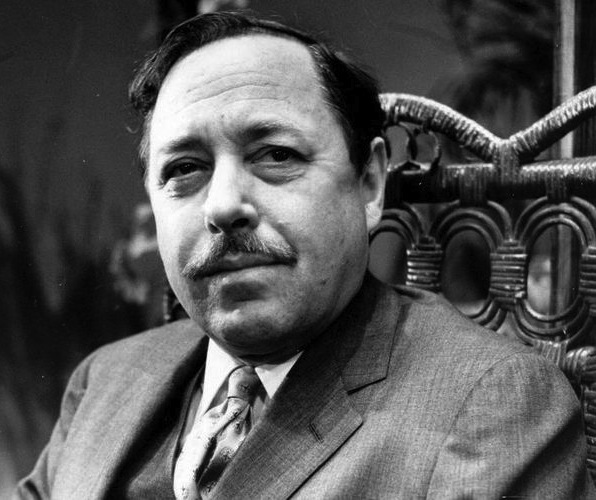Theater Feature: Tennessee Williams Theater Festival 2013 — An Exemplary Year
Tennessee Williams was a prolific writer, and each season the Festival presents an unfinished play or little known work from his vast canon.
By Robert Israel

Mink Stole and Penny Arcade star in SLAPSTICK TRAGEDY: THE MULITATED. The production was a standout at this year’s Tennessee Williams Theater Festival. It moves to New York’s New Ohio Theatre from November 1 through 24.
Provincetown, MA crowns a rugged spit of sand on Cape Cod that spirals out to the sea under an open sky. The quality of light and its welcoming residents have long attracted artists and writers, among them the late dramatist Tennessee Williams.
In the 1940s, Williams found personal and artistic freedom there. The ramshackle room he rented on Captain Jack’s Wharf in Provincetown’s west end still stands; it was here (among other locales) that he crafted some of his early dramatic works.
Nobel laureate Eugene O’Neill lived and flourished in Provincetown, too (circa 1920s). His Provincetown Playhouse was housed in a shack at the end of a wharf (it burned down decades ago). And while no record exists whether O’Neill and Williams ever met in Provincetown, we know they both frequented the same watering hole: Atlantic House.
Today, Atlantic House is affectionately called A-House. It still serves libations to thirsty patrons on Masonic Lane. Built as a tavern in the late 1700s, it is now a gay bar; a bronze plaque affixed near the doorway heralds O’Neill’s literary output while he was ensconced in his rented room. And local lore has it that Williams, two decades later, made a hasty retreat to an adjacent loft next door, seeking refuge from the wrath of a scorned male lover.
Because of these trailblazing playwrights — and others — Provincetown has established a spot on the literary map. Yet the town might not have cultivated that link had it not been for the Tennessee Williams Theater Festival, which revived it eight seasons ago.
Each year the Festival invites national and international thespians and directors – and audiences – to congregate in the town at the end of September for a four-day theatrical bacchanal.
Williams was a prolific writer, and each season the Festival presents an unfinished play or little known work from his vast canon. And unlike other theater get-togethers, the Williams Festival has taken a bold approach by showcasing his unfinished scripts alongside more polished works. Readings, live music and dance, films, and other happenings are peppered throughout the four days, most of them occurring in unusual settings and venues.
In years past, these venues have included the Boatslip, a bistro with an expansive deck overlooking Provincetown Harbor; a sea captain’s porch on Commercial Street where the audience was seated under a canvas tent as if attending a wedding; and makeshift stages in courtyards behind restaurants, in art galleries, and at the United Methodist Church.
Sometimes these locales succeed, sometimes they fail. The choice of Gifford House Inn, on Carver Street, was brilliant: theatergoers, attending Williams’ numerous hotel-themed one-acts, tramped up rickety stairs and squatted on floors while the actors revealed their secrets (and in some cases, as in Green Eyes, their naked bodies).
But the selection of the VFW post on Shank Painter Road last season failed: that venue, shabby and malodorous, diminished the effect of an otherwise powerful production of Williams’ Kingdom of Earth, performed by a stellar cast from South Africa. This year, a reprisal of that production, featuring the same cast, was relocated to the more commodious Provincetown Theater on Bradford Street.
The Festival is a cavalcade of serious theater, a celebration of an inventive playwright. And this year’s edition of the gathering, which closed on September 29, proved exemplary.
Among the highlights I attended this year were two productions:
Williams’ risky – and risqué – Slapstick Tragedy: The Mutilated was written in 1966. It enjoyed seven performances on Broadway before closing. Revived under Cosmin Chivu’s direction, it was performed at Gifford House Inn, where the audience was moved about, following the action from backyard, to porch, to a downstairs barroom. The production was terrific.
Featured was Mink Stole (a star of John Waters’ films), and Penny Arcade (a downtown Manhattan performance artist and political activist). It re-opens this fall at the New Ohio Theatre on Christopher Street, New York, from November 1 through 24. Set at The Silver Dollar Hotel on South Rampart Street in New Orleans, we meet Celeste (Penny Arcade) a woman of ill-repute with a taste for cheap California Tokay wine and an ample set of bosoms (“Go ahead and touch ’em,” she says. “They ain’t soap bubbles.”) But she gets no takers. She is hoping to win back the favors of her wealthy tight-wad friend, Trinket (Mink Stole), a resident of the hotel, who harbors a secret “mutilation” that only Celeste is privy to.
A chorus interrupts the action with perverse Christmas carols (“I think the strange, the crazed, the queer/Will have their holiday this year”), and a three-piece band, led by Jesse Selengut, who serenades the audience with tunes from the jazz era. But it’s the interplay between Celeste and Trinket (who eventually reconcile their differences) that steals the show. They take the audience on a merry romp, with moments of bathos, lewdness, violent outbursts, and crude jokes. When we finally arrive at the end of this hellish romp, we are filled with triumph and despair, having witnessed the shredding and refastening of the bonds of friendship and humanity.
Less successful was The Chorus Girl Plays, a jumbled together presentation of three one-acts Williams wrote early in his career (1935-1941). The play featured a cast from the dance troupe Danzloop Chicago: Paula Frasz provided the choreography, Robert Chevara directed. But it failed to elevate these three early works beyond their youthful and prurient origins. Part of the failure may have been the decision to cast professional dancers – five woman and two men – who were highly skilled as dancers but untrained as actors. Their delivery was frequently inaudible and flat. And while the plays contain shreds of brilliance, they are sketches rather than fully developed works.
There were many other offerings this year I could not attend, including full-length plays (Cat on a Hot Tin Roof, The Milk Train Doesn’t Stop Here Anymore, and a reprisal of Kingdom of Earth), in addition to mixers, parties, dinners, musical entertainers, and one-acts by Gertrude Stein and Jane Bowles.
Plans for the ninth season are already underway. I recommend planning to attend as soon as the schedule is posted online. Next September there will a lot to anticipate, when the theme of the Festival will be “Tennessee Williams and His Circle of Friends.”
Robert Israel writes about theater, travel and the arts, and is a member of Independent Reviewers of New England (IRNE). He can be reached at risrael_97@yahoo.com


